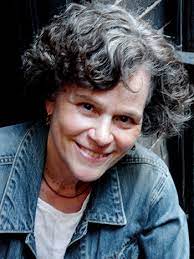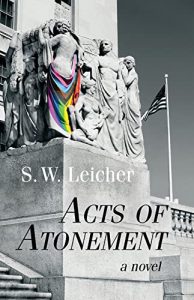Writing Outside Your Identity
 How dangerous—how wrong—is it for artists to feature people of different cultures and identities in their works? Is the risk of stereotype, of tokenism, of insensitivity—of usurpation—too great to dare that kind of inclusiveness?
How dangerous—how wrong—is it for artists to feature people of different cultures and identities in their works? Is the risk of stereotype, of tokenism, of insensitivity—of usurpation—too great to dare that kind of inclusiveness?
Yet how can artists possibly avoid including other people and other cultures in what they produce—especially if they live in places filled with people of all backgrounds and identities, continually influenced by their presence and their contributions?
I have a dancer friend, born in Estonia but living in New York, who likes to use a range of music in her dance classes. Roundly criticized one day for using African drumming in her class, she wondered: “Am I only permitted to choreograph to the works of Arvo Pärt?”
Okay, so maybe it’s all right for choreographers to occasionally incorporate music from other cultures into their dances. Or for writers to include the diverse characters who surround them in their written works. Particularly if those borrowings and inclusions are done with respect for those providing the inspiration.
But what if a writer attempts to tell an entire story from the point of view of someone of a different identity or culture? Is that finally going too far?
The two novels that I just completed, Acts of Assumption and Acts of Atonement, tell the love story of Serach Gottesman and Paloma Rodriguez—a headstrong, Orthodox Jewish young woman from Boro Park, Brooklyn and a street-smart, ambitious young Latina woman from the South Bronx.
Although I didn’t grow up Orthodox—or in the South Bronx—I have legitimate ties to both the Jewish and the Latin cultures. My father was an American Jew and my mother a Costa Rican Catholic immigrant. And I am indisputably acquainted with the thought-provoking, knotty (and occasionally hilarious) incongruities that can crop up when trying to blend those two cultures under one roof.
But I don’t identify as a lesbian. I’ve never had an affair with another woman. I’m married to a man. What right do I have to write—what authenticity and insight can I possibly bring to—two books that center around a same-sex relationship?
Here’s the scoop: I never set out to write a multi-cultural lesbian novel. My original plan was to write a short story about a pious little Orthodox boy named Shmuely who was facing a strange dilemma. But I quickly found that I needed a narrator with one foot in and one foot out of that insular community to tell the tale in a way that would be comprehensible to a general reading public. And so, I invented an iconoclastic older sister named Serach for that little boy and assigned her that role.
I decided to shape Serach’s iconoclasm around her being profoundly enthralled by both math and Torah. Neither of those passions is typically considered appropriate for a girl from that community—and a girl denied her deepest passions might easily be inclined to rebel.
What I didn’t initially intend, however, was to make Serach a lesbian. It was Serach herself who informed me of that fact. I was in the midst of inventing a scene in which she was helping her mother out with her wig store, when suddenly she turned to me and said: “Tell them! Tell them about the beautiful red-head who marched into the store and changed everything.”
There was nothing I could do. I couldn’t unhear what she’d said. So I went back and reconstituted the whole story, with Serach both as a lesbian and as the main character. Along with her partner, Paloma, who entered the scene shortly thereafter.
Because it was my characters telling me what to do, I forged ahead with confidence. And—perhaps even more importantly—I forged ahead because I truly believe that we are all somewhat gender- and sexually-fluid. I vividly remember what it was like to have crushes on female friends and teachers when I was a young, developing woman. And I certainly know what it is like to be a woman in love. It wasn’t such a stretch to put myself in Serach’s shoes. Or in Paloma’s.
What is more, I wasn’t shy about asking my lesbian friends to read what I’d written and correct me, as necessary. Just as I asked my observant Jewish friends to correct anything that I got wrong about Jewish observance. And my native Spanish-speaking friends and relatives to correct my occasionally inventive Spanish.
There is no doubt that artists must show care and respect when crossing certain lines. And there may be certain lines that it is simply impossible to cross. I invented Serach in the first place because I truly couldn’t get into her kid brother Shmuely’s head. Speaking in the voice of a pious twelve-year-old boy was simply beyond me, at least at first.
But I believe that it’s possible—appropriate, even—for artists to permit themselves to explore what are clearly universal feelings when creating their works. And to tap into other people’s perspectives and experiences as necessary, just so long as they do it with what I once heard a writer call: “appreciation—not appropriation.”
For what is art, after all, if not a way to help us—as both artists and audiences—to see things through new eyes?
—
S.W. LEICHER grew up in the Bronx in a bi-cultural (Latina and Jewish) home. She moved to Manhattan after earning her Master’s degree in Public Policy and raised her family on the Upper West Side, where she still lives with her husband and two black cats. When not dreaming up fiction, she writes about social justice issues for nonprofit organizations. Her latest novel is Acts of Atonement. For more about the author, visit www.swleicher.com.
ACTS OF ATONEMENT

Second in a two-book series on the rewards–and the price–of rebellion. Serach Gottesman–the sheltered but headstrong daughter of a rigidly Ultra-Orthodox Jewish family and Paloma Rodriguez–the tough, ambitious daughter of an even tougher Latina immigrant mother, meet in the first book and (unable to resist one another) launch a forbidden romance.
The story now picks up ten years later. Successfully pursuing their careers, ensconced in their big Flatbush Victorian home, delighting in the city’s diverse riches, hobnobbing with famous musicians–they’ve built a loving and satisfying life for themselves. Serach has made peace with all that she’s had to sacrifice–her faith, her old neighborhood, her beloved baby brother–to follow the path that she’s chosen. Paloma has become highly adept at deflecting her older brother’s resentment (and her own guilt) at how far she’s come since leaving the South Bronx behind her.
And then things happen. An unexpected death. A seductive opportunity. A reckoning over childrearing approaches. A brutal crime. An even more brutal arrest. And all those hard-won balances shift.
Acts of Atonementis a quintessential New York City novel (with a couple of side trips to Jerusalem). It illuminates two arch-typically urban communities–Orthodox Jewish Brooklyn and immigrant Latina Bronx. It zeroes in on a particular lesbian couple in a particular part of town. The questions it raises, however, are universal:
- In a society of robustly insular tribalism, can anyone fully escape the pull of what they’ve grown up with?
In a time of dazzling multi-culturalism, can anyone totally ignore the allure of competing worldviews?
- In a country that persistently brands certain groups as outsiders, can those outsiders ever truly receive fair treatment?
Can two born rule-breakers–no matter how initially smitten–live long-term within the confines and expectations of a permanent partnership?
Acts of Atonement asks how far any of us is willing to go to sustain love, to reclaim a heritage, to achieve justice–to stay true to our complicated selves.
BUY HERE
Category: How To and Tips





























If I cannot write about people other than my own small world, why would i write at all? The whole “only X can write about X” is terrifyingly restrictive. Sure, do your homework and be respectful to the gestalt, but tell the story. Not every story is an HEA.
I wrote about the third crusade in THE POMEGRANATE, but from a Jewish and Muslim perspective. I’m not Muslim, but I spent months researching Islam of that period to know what my characters would do and not do. Should I have only written about Jews, even thought the interaction between the two groups was so intertwined?
My characters tell me their stories and I merely record them. (You know what I mean.) My novels are definitely character driven. Am I to tell them not to work and play with ‘others’? I don’t think so!
The conversation about writing down the story from only your own perspective is terrifying…and yeah, I’ve been in conversations about just that. I don’t know what to make of political correctness on steroids.